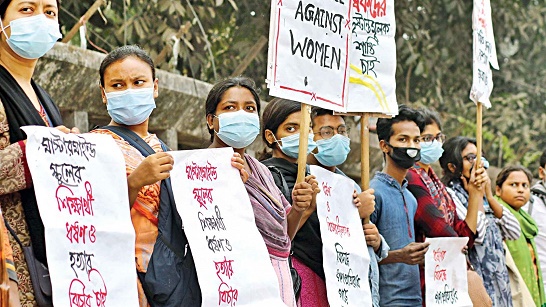
Victim blaming must stop

Whenever there is an incident of rape, most people tend to say that it was the girl or woman's fault, and question her character, social class, outfit, sexual experience, and lifestyle.
After the news of the rape and subsequent death of a 17-year-old O-level student was published Thursday night, many took to social media to blame the girl.
At a Dhaka court yesterday, 18-year-old Fardin Iftekhar Dihan confessed to his role in killing the girl after raping her. The doctor who did the postmortem also said excessive bleeding due to injuries from the rape led to her death.
Nevertheless, people on social media keep saying that it was consensual sex and should not be called rape. "The girl went on a date with her boyfriend… If the girl had any decency, she would have never gone to her boyfriend's flat before marriage," commented a Facebook user under the post of a news report about the incident.
A former teacher of the girl's school wrote, "The boy shouldn't be blamed alone. I am sure nothing must have happened without the girl's consent… Didn't she know the guy?"
Anthropology Professor Ainoon Naher of Jahangirnagar University said, "The offence of the perpetrator must be given more importance, because sexual violence doesn't only exist outside of home."
Khushi Kabir, coordinator of Nijera Kori, said, "When someone is killed by a car or hacked to death by robbers, people consider it as a criminal offence. Then why does a woman's character become relevant when she is raped and murdered?"
The mindset of men is the cause of frequent incidents of rape, and it has nothing to do with who the victim is, how she dresses or whether she has an affair, she told The Daily Star.
Taqbir Huda, research specialist at Bangladesh Legal Aid and Services Trust, who leads the Rape Law Reform Now Campaign, said "Whenever a rape gets reported, we see a large section of society normalising the crime and implying that the rape was almost inevitable.
"When you treat rape as inevitable by stretching the concept of 'boys will be boys', you are essentially telling men and boys to go and rape a girl to death, because we'll always find a way to put the blame on her.
"As long as we keep telling women and girls to 'avoid' getting raped instead of teaching boys not to rape, such incidents will repeat."
Umama Zillur, founder of KOTHA, a programme that addresses the attitudes, behaviours and conditions that support, condone and lead to sexual violence, said the victim-blaming on social media was just another reflection of how "comfortable we are with demonising women and their actions and behaviours, instead of holding men accountable."
"The victim-blaming even extended to the girl's parents. Some demanded they be punished for letting their daughter have too much freedom. But there was no question about the kind of environment at home and school and society that leads men to feel entitled to women's bodies," she added.
According to Ain o Salish Kendra, at least 1,627 women were raped and gang-raped across the country in 2020. Of them, 53 were killed after rape and 14 died by suicide.
The number of rape victims was 1,413 in 2019 and 732 in 2018, ASK mentioned in its 2020 annual report.
Editor & Publisher: S. M. Mesbah Uddin
Published by the Editor from House-45,
Road-3, Section-12, Pallabi, Mirpur
Dhaka-1216, Bangladesh
Call: +01713180024 & 0167 538 3357
News & Commercial Office :
Phone: 096 9612 7234 & 096 1175 5298
e-mail: financialpostbd@gmail.com
HAC & Marketing (Advertisement)
Call: 01616 521 297
e-mail: tdfpad@gmail.com